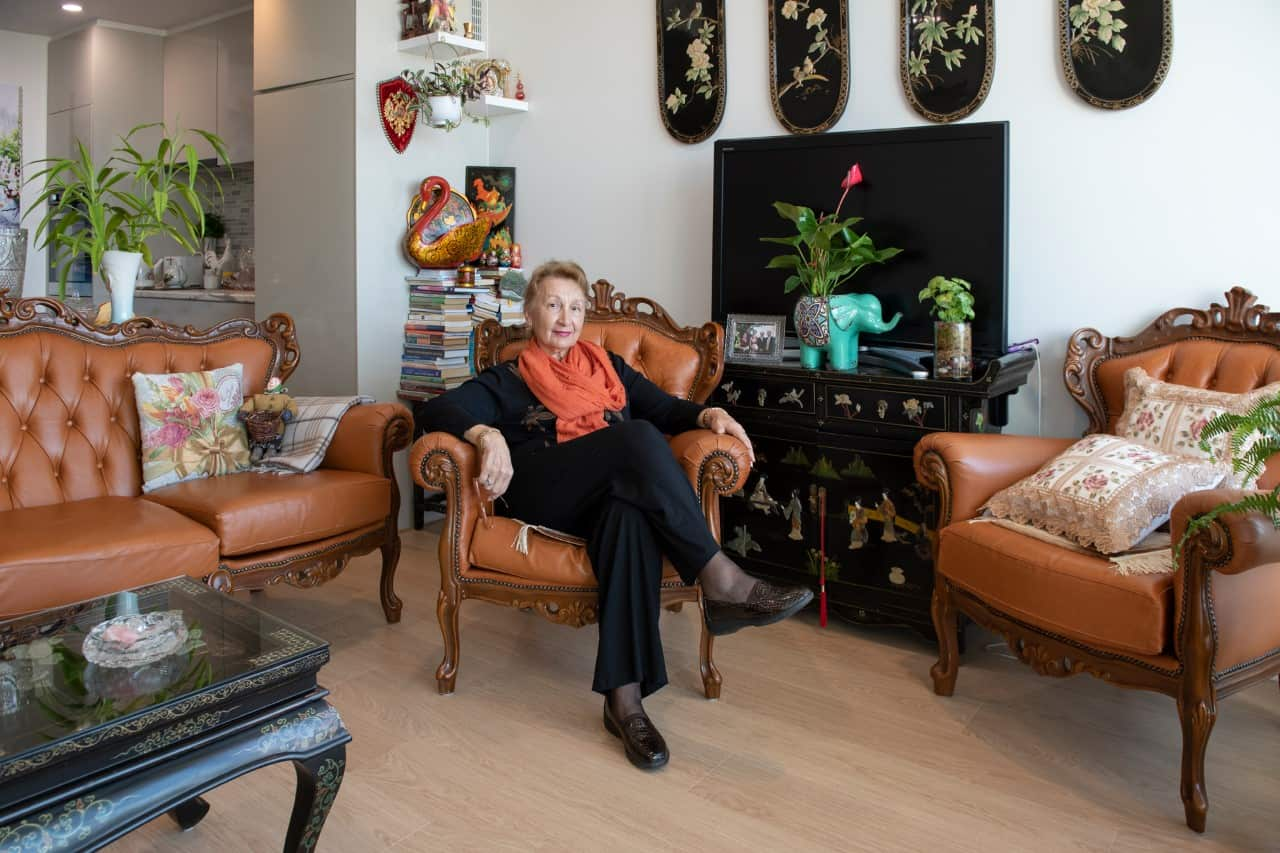When Russian artist and photographer Ekaterina Shipova-Bell moved to Australia from St. Petersburg 12 years ago, she brought two “particularly memorable” items with her.
A Greek vessel gifted by her grandmother, and a handmade Orthodox icon became her co-passengers on the journey to a new country she’d then call home.
Ms Shipova-Bell has now pieced together memories such as these from Russian migrant women and woven them into a mosaic that is on display at an exhibition in Adelaide’s Migration Museum. “There have been five waves of immigration from Russia to Australia,” the artist tells SBS Russian.
“There have been five waves of immigration from Russia to Australia,” the artist tells SBS Russian.

Photographer Ekaterina Shipova-Bell Source: Supplied by Ekaterina Shipova-Bell
I gathered the stories of women representing these waves
It was in 1944 in the erstwhile USSR during World War II that her great-grandmother blessed her grandmother with an Orthodox icon when she married Ms Shipova-Bell’s grandfather in the city of Chelyabinsk, to the east of the Ural Mountains which separate the European part of Russia from its Asian part.
Ms Shipova-Bell’s family was evacuated to this place from besieged Leningrad. “The icon is very interesting, unconventional. It is printed on paper with embroidery on top. The paper is sewn to a silk patch, which is painted with poppies.
“The icon is very interesting, unconventional. It is printed on paper with embroidery on top. The paper is sewn to a silk patch, which is painted with poppies.
Source: Supplied by Ekaterina Shipova-Bell
"It is very small, it fits in the palm of your hand,” Ms. Shipova-Bell says as she describes the heirloom piece. She doesn’t know who embroidered and painted the fabric, but Ms Shipova-Bell considers this a very special item that marks her sense of belonging to her family, culture and homeland.
She doesn’t know who embroidered and painted the fabric, but Ms Shipova-Bell considers this a very special item that marks her sense of belonging to her family, culture and homeland.
Source: Supplied by Ekaterina Shipova-Bell
“Belonging” is also the name of Ms Shipova-Bell’s exhibition, which chronicles the lives of 16 women and their journey from Russia to Australia through photographs.
In these frames are portraits of women in their homes adorned with the special and meaningful objects brought from Russia, which they treasure as reminders of their belonging and make up their cultural code. The complex and dramatic history of Russia in the 20th century forced people to leave their homes and migrate to Europe, the US, China and Australia.
The complex and dramatic history of Russia in the 20th century forced people to leave their homes and migrate to Europe, the US, China and Australia.

Лилия Михайлова Source: Supplied by Ekaterina Shipova-Bell
The Russian Revolution and the fall of the Empire, the repression and persecution of representatives of some nationalities, the Second World War, the fall of the USSR, the political and economic situation in modern Russia – all contributed to the spread of Russians throughout the world in the 20th and the 21st centuries.
With them, they took a part of their culture, expressed in their way of thinking, beliefs, faith and, of course, decorative items and art that depicted Russia.
Ms Shipova-Bell and her friend, film director Sofia Mikhaylovskaya, visited these Russian women in South Australia and recorded their stories.
“They made us feel welcome and prepared dinner for us. I felt the connection with my homeland and even the pain of some of them,” Ms Shipova-Bell says.
The most moving stories were about objects that belonged to their grandparents or parents

Source: Supplied by Ekaterina Shipova-Bell
When she was a little girl, she loved examining this figurine at her grandmother’s buffet but was not allowed to touch it. Later, her grandmother told her the very special story behind the figurine.
Svetlana’s grandfather carried this statuette with him in his uniform coat, close to his heart, during World War II because it reminded him of his wife and child

Source: Supplied by Ekaterina Shipova-Bell
This famous book with colourful illustrations became the first drawing manual for Larisa.
Her grandmother taught her how to make still-life paintings using the images from the cookbook.
“I used it to draw a ham for a tiger from the book by A. Brem,” Ms Rogacheva says.
In it, I first read about an artichoke. I was amazed that Italians eat burdock, poor fellows! And now, it grows in my garden

Source: Supplied by Ekaterina Shipova-Bell
“It is a very heavy marble lamp, which her parents gave her when she graduated from college,” Ms. Shipova-Bell says.
The gift symbolises the famous Russian proverb that translates to ‘learning is light and ignorance is darkness’

Source: Supplied by Ekaterina Shipova-Bell
Ballet teacher Valentina Pavlova from Grozny, Chechnya, brought with her things mostly related to her profession: pointe shoes, books, statuettes and photographs that remind her of how she danced in the Kremlin Ballet and with other troupes, and also about her work with global ballet stars as Maya Plisetskaya, Ekaterina Maksimova and others.
The exhibition “Belonging” at the Migration Museum in Adelaide is a part of the SALA Festival 2021 exhibition and is on till September 26.
